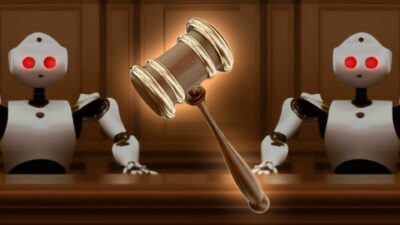In a move that’s about as surprising as watching a rerun of “Friends,” the music industry has decided to take AI startups Suno and Udio to court. Universal Music Group, Warner Music Group, and Sony Music Group are leading the charge, filing two separate lawsuits that are bound to make waves in both the music and tech worlds. Let’s break down this legal symphony, shall we?
The Lawsuits: A Duet of Discontent
The Recording Industry Association of America (RIAA) has orchestrated two lawsuits, one in New York and another in Massachusetts, against AI music generators Suno and Udio. The crux of their argument? These AI companies allegedly trained their models on copyrighted tunes without so much as a “pretty please” or a licensing agreement.
The record labels aren’t just looking for a slap on the wrist here. They’re demanding injunctions to stop future unauthorized use and damages that could hit a high note of $150,000 per infringed work. That’s enough to make even the wealthiest tech bros sweat.
The record labels aren’t just looking for a slap on the wrist here. They’re demanding injunctions to stop future unauthorized use and damages that could hit a high note of $150,000 per infringed work.
AI-Generated Music: A Cover Band on Steroids?
Before we dive deeper, let’s take a moment to appreciate what these AI models can do. Suno and Udio have developed text-to-music interfaces that are essentially the musical equivalent of ChatGPT or Midjourney. It’s like having a virtual band at your fingertips, ready to compose on command.
But here’s where it gets sticky. The RIAA claims these AI-generated tracks are hitting a little too close to home. We’re talking about AI versions that sound eerily similar to hits by The Temptations, Green Day, Mariah Carey, and even The Boss himself, Bruce Springsteen. It’s like stumbling into a karaoke bar where the machines have taken over.
The Chuck Berry Test
To illustrate their point, the lawsuit details how an AI tool practically cloned Chuck Berry‘s “Johnny B. Goode” using specific prompts. It’s less “Great Scott!” and more “Great Lawsuit!” at this point.
The Industry’s AI Tango
Now, before you start thinking the music industry is completely anti-AI, let’s set the record straight. The RIAA isn’t against AI training on copyrighted works per se. They just want it done by the book – with proper licensing and fair compensation. It’s like saying, “Sure, you can come to the party, but you’ve got to RSVP and bring a bottle.”
Some industry players are already embracing AI under the right conditions. Universal Music Group, for instance, has been cutting deals with SoundLabs and YouTube for AI licensing agreements. It’s a sign that the industry is willing to dance with AI, as long as it doesn’t step on their toes.
The Great Debate: Cash Grab or Copyright Crusade?
So, is this just the music industry trying to cash in on the AI gold rush, or are they genuinely protecting the rights of artists? It’s worth noting that we’re not talking about performance rights here – this is all about masters, which are typically owned by the record companies. The devil, as they say, is in the details.
Suno’s co-founder Mikey Shulman is standing his ground, claiming their practices are legal and industry-standard. But the lawsuits argue that both Suno and Udio have been playing coy about their training data, which smells suspiciously like deliberate copyright infringement.
The Bigger Picture
This legal battle is more than just a spat between Big Music and AI upstarts. It’s a defining moment that could shape the future of AI in creative industries. Every human musician learns by listening to copyrighted works, and composers have long been asked to create pieces “inspired by” existing material. It’s how the industry has always functioned.
Now, the courts will have to decide where to draw the line. Can AI companies use copyrighted material to train their models? If so, under what conditions? The answers to these questions will have far-reaching implications for the future of music creation and copyright law.
As this legal drama unfolds, one thing’s for certain: the music industry isn’t about to let AI compose its future without a fight.
Music industry giants, UMG, Warner, and Sony, sue AI startups Suno and Udio for training their models on copyrighted music without permission. #musicindustrynews #musiclawsuit #aiinmusic #copyrightinfringement #aigeneratedmusic Share on Xt











 LEGO Porn: French Photographer Creates Realistic Nude Women Out of Bricks
LEGO Porn: French Photographer Creates Realistic Nude Women Out of Bricks
Leave a Reply
You must be logged in to post a comment.